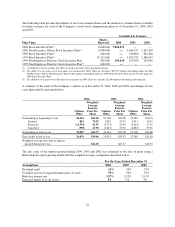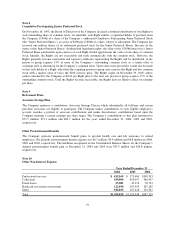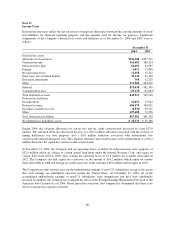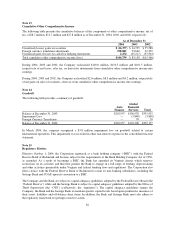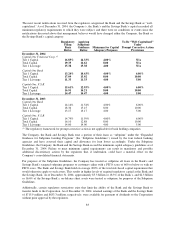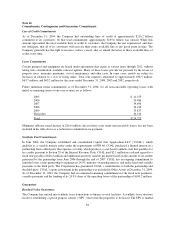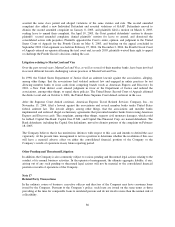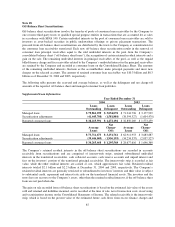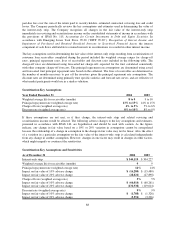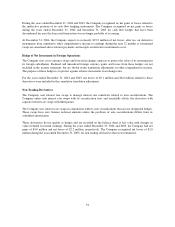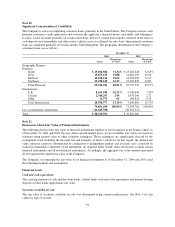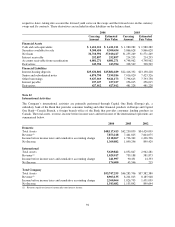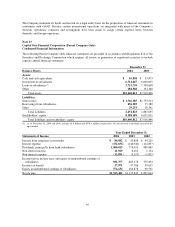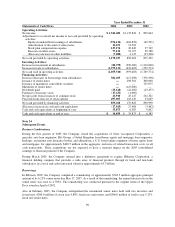Capital One 2004 Annual Report Download - page 109
Download and view the complete annual report
Please find page 109 of the 2004 Capital One annual report below. You can navigate through the pages in the report by either clicking on the pages listed below, or by using the keyword search tool below to find specific information within the annual report.asserted the same class period and alleged violations of the same statutes and rule. The second amended
complaint also added a new Individual Defendant and asserted violations of GAAP. Defendants moved to
dismiss the second amended complaint on January 8, 2003, and plaintiffs filed a motion on March 6, 2003,
seeking leave to amend their complaint. On April 10, 2003, the Court granted defendants’ motion to dismiss
plaintiffs’ second amended complaint, denied plaintiffs’ motion for leave to amend, and dismissed the
consolidated action with prejudice. Plaintiffs appealed the Court’s order, opinion, and judgment to the United
States Court of Appeals for the Fourth Circuit on May 8, 2003, and briefing on the appeal concluded in
September 2003. Oral argument was held on February 25, 2004. On December 2, 2004, the Fourth Circuit Court
of Appeals entered an opinion affirming the trial court and, in early 2005, plaintiffs waived their right to appeal
or challenge the Fourth Circuit’s decision, ending the case.
Litigation relating to MasterCard and Visa
Over the past several years, MasterCard and Visa, as well as several of their member banks, have been involved
in several different lawsuits challenging various practices of MasterCard and Visa.
In 1998, the United States Department of Justice filed an antitrust lawsuit against the associations, alleging,
among other things, that the associations had violated antitrust law and engaged in unfair practices by not
allowing member banks to issue cards from competing brands (such as American Express and Discover). In
2001, a New York district court entered judgment in favor of the Department of Justice and ordered the
associations, among other things, to repeal these policies. The United States Second Court of Appeals affirmed
the district court and, on October 4, 2004, the United States Supreme Court denied certiorari in the case.
After the Supreme Court denied certiorari, American Express Travel Related Services Company, Inc., on
November 15, 2004, filed a lawsuit against the associations and several member banks under United States
federal antitrust law. The lawsuit alleges, among other things, that the associations and member banks
implemented and enforced illegal exclusionary agreements that prevented member banks from issuing American
Express and Discover cards. The complaint, among other things, requests civil monetary damages, which could
be trebled. Capital One Bank; Capital One, F.S.B.; and Capital One Financial Corp. are named defendants. The
Bank defendants, including the Capital One defendants, moved to dismiss portions of the complaint on February
18, 2005.
The Company believes that it has meritorious defenses with respect to this case and intends to defend the case
vigorously. At the present time, management is not in a position to determine whether the resolution of this case
will have a material adverse effect on either the consolidated financial position of the Company or the
Company’s results of operations in any future reporting period.
Other Pending and Threatened Litigation
In addition, the Company is also commonly subject to various pending and threatened legal actions relating to the
conduct of its normal business activities. In the opinion of management, the ultimate aggregate liability, if any,
arising out of any such pending or threatened legal actions will not be material to the consolidated financial
position or results of operations of the Company.
Note 17
Related Party Transactions
In the ordinary course of business, executive officers and directors of the Company may have consumer loans
issued by the Company. Pursuant to the Company’s policy, such loans are issued on the same terms as those
prevailing at the time for comparable loans to unrelated persons and do not involve more than the normal risk of
collectibility.
86


